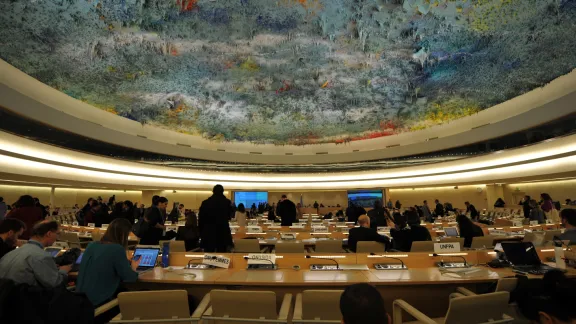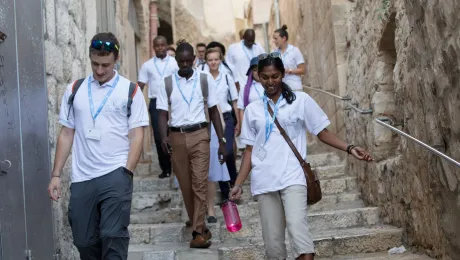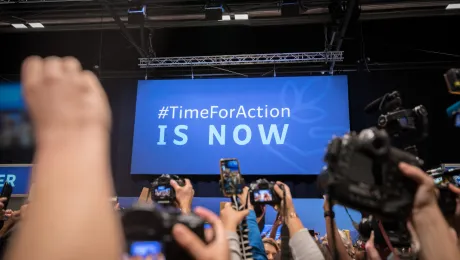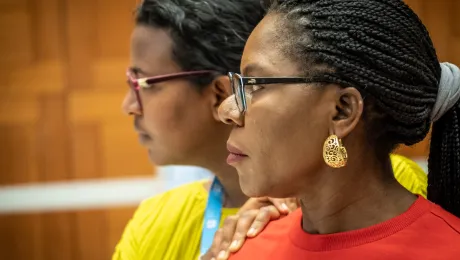Promoting human dignity, justice, and peace
In all our human rights advocacy, we hold governments accountable for their human rights obligations, particularly in the context of international United Nations frameworks.
Building on the needs and experiences of the communities we serve, we engage with and contribute to national, regional and international human rights mechanisms.

The ceiling of the Human Rights Council, in the Palais des Nations where sessions typically take place. Photo: LWF/C. Kästner
Read about our main areas of engagement with the United Nations
- United Nations Human Rights Council ¶
- Universal Periodic Review ¶
- Special Procedures ¶
- Human Rights Policy Briefs ¶
The UN Human Rights Council is the United Nations body responsible for promoting and protecting human rights around the globe. It comprises 47 UN member states and meets three times a year to discuss human rights issues and countries that need its attention.
Civil society organizations with ECOSOC (Economic and Social Council) status, such as the LWF, can participate in discussions by delivering oral statements or submitting written statements to raise human rights concerns during council sessions. In addition, the council also provides space for ECOSOC-accredited civil society organizations to organize side events during its meetings. Here, the issues in focus at the sessions are discussed in greater depth, enabling civil society organizations’ views and concerns to shape the council’s decisions.
The LWF strives to bring grassroots voices and concerns to the council through oral and written statements, side events, or lobbying diplomats in Geneva. In addition, we work closely with our ecumenical partners and other civil society organizations in Geneva to ensure the council delivers on its mandate to promote the full implementation of human rights obligations undertaken by states.
The Universal Periodic Review (UPR) is one of the mechanisms of the UN Human Rights Council aimed at improving the human rights situation in each of the 193 United Nations member states. Under this mechanism, the UN reviews the human rights situation of all of its members every 4 to 5 years. The review is based on three types of reports, namely: national reports (prepared by the state under review), UN reports (compiled by the Office of the High Commissioner for Human Rights), and other stakeholder reports (submitted by civil society and national human rights institutions).
Since the creation of this mechanism, the LWF, its country programs, member churches, and partners have brought local voices to the attention of the UN and influenced the review in favor of local communities. We do this by training national civil society organizations and helping create coalitions of national civil society organizations before the review. We also support lobbying in Geneva during the review and help support national civil society organizations to implement review recommendations.
The special procedures of the Human Rights Council are independent human rights experts with a mandate to monitor and report on a wide range of human rights and advocate for their protection. They undertake country visits, conduct thematic studies, raise public awareness on specific human rights issues. Also, they engage in advocacy by sending communications to states and others in which they bring alleged violations or abuses to their attention. Special procedures are thematic mandate holders, like the special rapporteur on the right to food, or specific country mandate holders, as the special rapporteur for the Central African Republic.
As a civil society organization, the LWF plays an essential role in the work of the special procedures. In most cases, they are the primary source of information for communications on allegations of human rights violations. We collaborate on the preparation of country visits, submit data to prepare thematic reports, and organize seminars and conferences to disseminate the work of special procedures. In all its priority global advocacy areas, the LWF works closely with the special procedures mechanisms.
LWF human rights policy briefs are short and informative analyses of some of the thematic or country-specific human rights issues we engage with globally or locally through member churches or World Service country programs. The objective is to document human rights issues emanating from our work and promote alternative action or policy recommendations. The briefs can take the form of objective policy discussions, highlighting the prominence of specific problems and calls for action without necessarily taking a position, or they can be advocacy briefs, arguing for a particular course of action or adopting a specific alternative.

LWF Advocacy Milestones
- 1947 – The first resolution of the First LWF Assembly (Lund, Sweden) concerns refugees
- 1952 – The LWF gains formal consultative status with the United Nations
- 1977 – LWF declares that apartheid must be rejected as a matter of faith
- 1984 – Seventh LWF Assembly (Budapest, Hungary) is the first global Christian meeting behind the Iron Curtain
- 1990 – LWF plays a vital role in Namibia’s transition to independence
- 1996 – LWF helps start negotiations leading to an end of the Guatemalan civil war
- 1997 – LWF is part of International Campaign to Ban Land Mines
- 2012 – An all-youth LWF delegation advocates at the UN Climate Change conferences (COP18 in Doha, Katar)
Contact
Get Involved
Share with us your stories, photographs and insights using the #LWF





